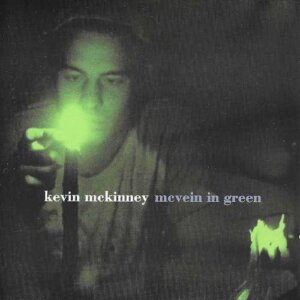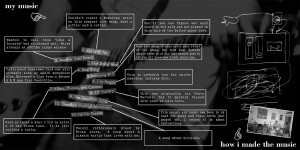LP Reviews: Kevin McKinney: McVein in Green (2002, Shat Records)
 What’s disarming at first about an album like McVein in Green (2002, Shat Records) is how personal it feels. Like the unreleased tape every artist has in their closet — only a few of which we actually get to hear — listening to McVein in Green is an experience that conjures up visions of late night sessions in darkened living spaces — jamming, looping, artist hunched over recording equipment for hours on end, mic in face, guitar in lap. And yet here we are with a copy in our disc player, eavesdroppers, lucky in the end that tape was rolling and that the tape was the product.
What’s disarming at first about an album like McVein in Green (2002, Shat Records) is how personal it feels. Like the unreleased tape every artist has in their closet — only a few of which we actually get to hear — listening to McVein in Green is an experience that conjures up visions of late night sessions in darkened living spaces — jamming, looping, artist hunched over recording equipment for hours on end, mic in face, guitar in lap. And yet here we are with a copy in our disc player, eavesdroppers, lucky in the end that tape was rolling and that the tape was the product.
More than that, McVein in Green is what you get when the artist is directly responsible for everything. Damn the producers! The artist is the producer, on the spot, where it counts. Of course, if something sounds awkward or quirky, it’s because the techniques used to record an album like this are, let’s say, decidedly not technical. “Things fall apart,” said Yeats. But things can go well, too. So well, in fact, that you’d almost never know a single person played, recorded and produced all of it.
But you won’t miss anything (without the fancy production that is). Because what makes an album like this work or not is the quality of the songwriting, and McKinney has that in spades … he just also manages to sound good doing it.

By waiting many years to record a solo album, McKinney had a fairly sizable repertoire from which to draw — going as far back as 1998 for $5 Man (a number developed by the original Soulhat trio), Killers Thieves and Conmen (a SHAT Records staple), and City People (which appears in slightly different form on Experiment on a Flat Plane). But the majority of these tunes were written fairly recently, performed in public only for the folks who’ve attended McKinney’s solo gigs at Flipnotics or the Saxon Pub.
The newer songs are an impressive lot. Rot with You (a love sone about composting) has gone from being an almost laughable throwaway to a striking opening number, a twisted kind-of love song that sets the mood perfectly. And even if the leading drum riff teases that famous Frosty beat, you know you’re in for something a little different.
The tune that follows it, for example, Another Cold Sweat (which has become Tornadic), previews the eclectic blend we find all over this album — a painstakingly layered mix of acoustic guitar, live drums, grooving bass, harmonica, keyboards, drum machine, percussion, searching electric guitars, and McKinney’s multi-tracked voice (which has never sounded better). Yet even if home recording gives this artist the potential for overdoing it, no single element here overwhelms the mix. Not once does one wish, “I could use a little more of x or a little less of y.” It’s just that subtle.
McKinney effectively uses this platform to lay out his musical vision, which now seems more fully realized than the one we know from Soulhat. For the most part, rock has given way to groove (with some skillful pop thrown in for good measure) and in doing so, more accurately reflects the diversity of styles McKinney is capable of producing. Killers, Thieves and Conmen bristles like a burning Hendrix outtake with vocals crackling from fuzzed-out acetate. T.V. Factory delightfully continues McKinney’s love-hate relationship with the boob tube, falling loosely somewhere between pre-Wings McCartney and XTC. And I’m No Rapper closes the album with classic McKinney aplomb — so you were expecting Brain Damage or A Day in the Life? How ’bout McKinney rapping over a “Funky Drummer” beat? Add three solid roots-pop songs (Best Thing, Goodbye, and Shame) that could each rule the right alternative radio market — are you listening KGSR?! — and you’ve got an album that wants for nothing.
Certainly no one would’ve expected it’d take McKinney this long to release a solo album, considering his inclination to write great music. The surprise has only been the way he chose to present it. And frankly, it’s a testament to McKinney’s vision that any future studio versions are unlikely to improve upon those presented here. If he isn’t trying to make just another Soulhat album, with McVein in Green, at least McKinney has managed to bolster his credentials as a songwriter who instinctively knows what sounds good, too.
—Staff Writers